MoniQA – A new EU-project towards the harmonisation of analytical methods for monitoring food quality and safety in the food supply chain
- Like
- Digg
- Del
- Tumblr
- VKontakte
- Buffer
- Love This
- Odnoklassniki
- Meneame
- Blogger
- Amazon
- Yahoo Mail
- Gmail
- AOL
- Newsvine
- HackerNews
- Evernote
- MySpace
- Mail.ru
- Viadeo
- Line
- Comments
- Yummly
- SMS
- Viber
- Telegram
- Subscribe
- Skype
- Facebook Messenger
- Kakao
- LiveJournal
- Yammer
- Edgar
- Fintel
- Mix
- Instapaper
- Copy Link
Posted: 4 September 2007 | Roland Ernest Poms, ICC – International Association for Cereal Science and Technology, Vienna, Austria – Coordinator of MoniQA | 1 comment
MoniQA is an EU funded Network of Excellence (NoE), which works towards harmonisation of analytical methods for monitoring food quality and safety in the food supply chain. The MoniQA NoE (Contract N0. FOOD-CT-2006-36337) is coordinated by the Vienna-based ICC (International Association for Cereal Science and Technology) and is set to receive €12.3million by the European Commission for its activities between 2007 and 2012 within the Sixth Framework Programme Topic T5.4.5.1: Quality and safety control strategies for food (NOE).
MoniQA is an EU funded Network of Excellence (NoE), which works towards harmonisation of analytical methods for monitoring food quality and safety in the food supply chain. The MoniQA NoE (Contract N0. FOOD-CT-2006-36337) is coordinated by the Vienna-based ICC (International Association for Cereal Science and Technology) and is set to receive €12.3million by the European Commission for its activities between 2007 and 2012 within the Sixth Framework Programme Topic T5.4.5.1: Quality and safety control strategies for food (NOE).
MoniQA is an EU funded Network of Excellence (NoE), which works towards harmonisation of analytical methods for monitoring food quality and safety in the food supply chain. The MoniQA NoE (Contract N0. FOOD-CT-2006-36337) is coordinated by the Vienna-based ICC (International Association for Cereal Science and Technology) and is set to receive €12.3million by the European Commission for its activities between 2007 and 2012 within the Sixth Framework Programme Topic T5.4.5.1: Quality and safety control strategies for food (NOE).
The MoniQA (“Monitoring and Quality Assurance in the Food Supply Chain”; full title: “Towards harmonisation of analytical methods for monitoring food quality and safety in the food supply chain”) NoE seeks to establish durable integration of leading research institutions, industrial partners and SMEs working in complementary fields of food analysis to assure food quality and safety. MoniQA aims at overcoming European and worldwide fragmentation in food diagnostic research by integrating key organisations in an NoE. Benefits through dissemination and joint research will also be available to associated partners. The consortium seeks to establish mechanisms for coordinating and where possible, fully merging research activities, personnel and infrastructure. The industry and SME sector will benefit through application of harmonised protocols and mutually/globally accepted analytical methods fulfilling defined requirements. Finally the consumers and international trade will benefit through high quality and safe food, which has been tested by reliable and accepted methods.
MoniQA will play an important role in integrating worldwide food quality and safety research by creating a virtual laboratory for joint research, training, dissemination and mobility programmes. It will allow and actively promote sharing of data and knowledge, as well as equipment, materials and personnel through creation of a global platform for food quality and safety researchers. Integrating activities will enable shared access to world’s best research facilities, technological platforms, databases, analytical tools and knowledge. The joint programme will allow high quality research directed towards the most pressing issues fulfilling both food quality and safety policies, as well as citizens’ concerns. The network will develop common strategies for harmonising and validating detection methods and technological strategies to set new standards in food quality and safety initially within production and extending throughout the whole food supply chain.
The MoniQA NoE officially started 1 February 2007. More than 155 researchers and scientists, including 40 PhD students, from 33 international partners in 20 countries are integrated in the MoniQA Network (see Table 1a). It will also expand its activities to other invited institutions around the globe. Around 65 delegates from 22 countries, including representatives from the partner countries and members of the MoniQA Advisory Panel (see Table 1b) attended the MoniQA kick-off meeting in Vienna between the 20th and 22nd March 2007. The meeting was opened at the Renaissance Hotel by the coordinator of MoniQA, Roland Ernest Poms from ICC; Matthias Reeh, Vice Director General of the Austrian Federal Ministry of Agriculture; Maria Spulber and Patrice Lemaitre, both from DG Research of the European Commission. The meeting was dedicated to introducing the detailed activities of the various work packages and planned work groups, which will address analytical challenges, global harmonisation and standardisation efforts, industry needs for rapid and new analytical methods, Information and Communication Technologies in updated HACCP concepts, databases, and better future regulations.
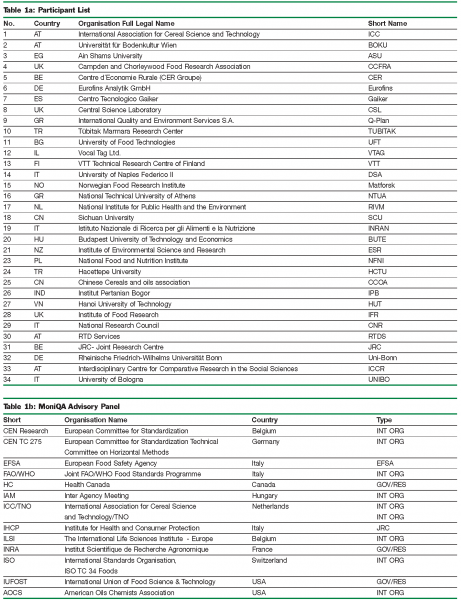

Background and motivation
With the rise of globalisation, more and more foods and food products are being traded around the world. Ensuring that these foods are of a high quality and safe to eat when they reach the consumer requires reliable food analysis techniques. However, different countries currently use different methods to test foods for the presence of harmful substances.
The MoniQA project aims to make the food chain safer by harmonising the methods used to analyse food for safety and quality. The project partners will create a virtual laboratory outlining details of food safety issues and the various food testing and analysis methods in use. Researchers will be able to exchange data and knowledge, helping them to develop common strategies which could form the basis of new standards in food quality and safety assessment.
By implementing joint research programmes and promoting exchanges of research between the partners, the project partners hope to develop solutions which will be acceptable to consumers, manufacturers and regulatory bodies as well as other groups involved in the food chain. The researchers will also investigate the food quality and safety implications of new processing technologies, and identify future research needs. These needs will be investigated along the whole food supply chain, which has become a complex system of manifold crossroads between suppliers and producers until the final food product reaches the retail stores and ultimately the consumer (see Figure 1). At each crossing point some sort of documented quality control is required, which must be acceptable to the supplying and the receiving parties as well as to regulatory authorities and control institutions.
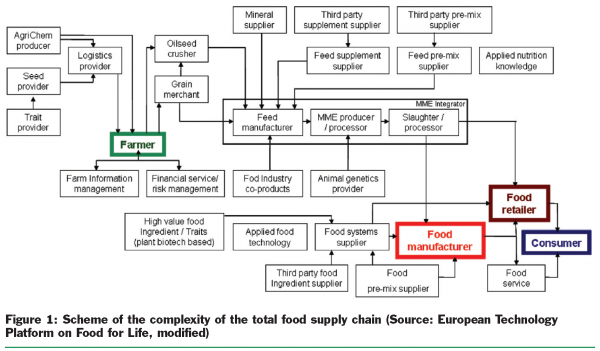

The network members will investigate mechanisms to coordinate and merge research activities, personnel and infrastructure to achieve synergetic affects. The resulting harmonised analytical strategies and methods, databases and training modules will extend beyond the network to associated partners and involved stakeholders. Food production industries and SMEs will benefit through harmonised analytical methods and technologies, as will the end consumers.
Integrating activities will facilitate shared access to the world’s best research facilities, technological platforms, databases, analytical tools and knowledge. Joint research is directed towards the most pressing issues to fulfil food quality and safety policies, as well as citizens’ concerns. The network will develop common strategies for harmonising and validating detection methods and technologies to set new standards in quality and safety – within food production and extending throughout the whole food supply chain.
A summary of the issues/ motivation points for the MoniQA project are given below:
- New EU Regulations (e.g. food allergens, mycotoxins, other food contaminants)
- Fragmentation of research and standardisation (e.g. little or no communication between research centres and standardisation bodies, duplication of research and validation work, more collaboration, decreasing costs…)
- Limited validity of standardisation/validation certificates
- Need for rapid methods
- Lack of appropriate validation protocols for new and rapid methods (e.g. qualitative methods)
- Lack of reference methods and reference materials for some analytes (e.g. food allergen detection methods and accepted reference materials)
In the long term, the consortium hopes that the project will form the basis of a network of food safety and quality experts, which will continue to exist long after the initial project has come to an end.
Project objectives
Overall Objectives
- Overcoming fragmentation of research activities and achieving a sustainable network by facilitating exchange of personnel, sharing of infrastructure and developing joint economic models.
- Developing common tools such as guidelines for harmonisation of methods, as well as databases to fill gaps in collective knowledge portfolio on food quality and safety issues including analysis of the impacts of new methods and regulations
- Communicating progress and results through involvement of relevant stakeholder groups and facilitating knowledge sharing and a learning culture within the network through joint education and training programmes, and e-learning tools.
Integration Objective
To overcome fragmentation of research activities by coordinating and merging research portfolios in terms of infrastructure, personnel and joint economic models to achieve a sustainable network.
Leader: VTT – Technical Research Centre of Finland, Maria Saarela
Joint Research Objective
Develop collective knowledge of the network by producing common tools such as guidelines for harmonisation of detection methods and technologies, good traceability practices, databases for food quality and safety assessment and socio-economic impacts of new EU food quality and safety regulations.
Leader: CSL – Central Science Laboratory, UK, Martin Rose
Spreading of Excellence Objective
To promote results generated by the network to targeted stakeholder groups, as well as to facilitate and foster a knowledge sharing and learning culture within the network through educational programmes and training courses.
Leader: Q-Plan – International Quality and Environment Services S. A., Greece, Christos Tapinos
Management Objective
Establish an efficient management structure with independent quality assurance that can be sustained beyond the EC funding.
Leader: ICC – International Association for Cereal Science and Technology, Austria, Marcella Gross
The objectives for the network have been summarised in a ten-point plan:
The ten-point programme of specific objectives for the full duration of the MoniQA NoE
For Durable Integration
1. Merge partner strengths through shared use of infrastructure into a portfolio of synergetic research to meet emerging food quality and safety challenges on global scale.
2. Establish a mobility programme to promote the exchange of personnel for both short term secondments and full relocation within the network of participant institutions.
3. Achieve a sustainable network to ensure durable integration of international research institutions through development of joint economic models, research programmes and intellectual property.
For Joint Research
4. Develop harmonisation guidelines for risk assessment and standardisation of detection methods and technologies in food safety and quality.
5. Assess implications of advanced processing and monitoring technologies implemented in modern HACCP systems. Identify and prioritise gaps and needs for future food quality and safety research.
6. Develop a database of food quality and safety issues and corresponding analytical tools for food production and supply chain including information on the validation level and a thesaurus of terms and definitions used in standardisation/validation of analytical methods.
7. Analyse new EU food quality and safety regulations with respect to industry, control and regulatory bodies and regarding their socio-economic impacts in terms of efficiency, effectiveness and consistency, their administrative costs and their impact on international trade.
For Spreading of Excellence
8. Facilitate knowledge sharing within the network and dissemination to food production and supply chain and other relevant stakeholder groups for harmonisation of, and compliance with food quality and safety standards.
9. Define requirements for, and set up training programmes to achieve harmonised levels of know-how and skills, along with mutual recognition of academic and industrial qualifications.
For Consortium Management
10. Establish an efficient management structure with quality assurance that can be sustained beyond the EC funding.
The following key deliverables are foreseen during the five year duration of the project. Further issues will be tackled, if priorities change or new challenges arise.
Key deliverables (resulting from the ten-point programme)
1. The MoniQA network has an operational system to facilitate sharing of research infrastructure, equipment and databases.
2. A fully functional mobility programme allowing easy and regular exchange of personnel between network member organisations.
3. A sustainability programme to ensure economic durability and long term co-operation of the network and the network management.
4. Harmonisation guidelines for risk assessment and standardisation of detection methods and emerging technologies.
5. Report of modernisation potential in monitoring and quality assurance in the food supply chain employing advanced on-line technology including a research agenda (2010 – 2020).
6. Database of food quality and safety issues and corresponding analytical tools for food production and supply chain available to network members and associates, which will also include level of validation and legal requirements.
7. Socio-economic analysis reports of the impact of new regulations and the implementation of harmonised detection methods and technologies at micro and macro levels.
8. Knowledge management platform and culture; dissemination activities; web site and dissemination material, annual network meetings including associates and bi-annual conference taking place in various countries.
9. International curricula of mutually recognised training courses (including e-learning) and qualifications for both university and industry.
10 An efficient and quality assured network management scheme that can be sustained beyond the EC funding.
According to the ten-point plan and the corresponding key deliverables MoniQA’s original work plan is organised in 4 Programmes (P) and 10 Workpackages (WP) (see Table 2). WP 1-3 will deal with consortium building and integration activities, WP 4-7 will focus on joint research activities, WP 8+9 will establish training and dissemination pathways and tools, WP 10 will work on a functional management system, which will be sustainable beyond the project funding by the EU. Expected results generated by the MoniQA project are summarised in Table 3.
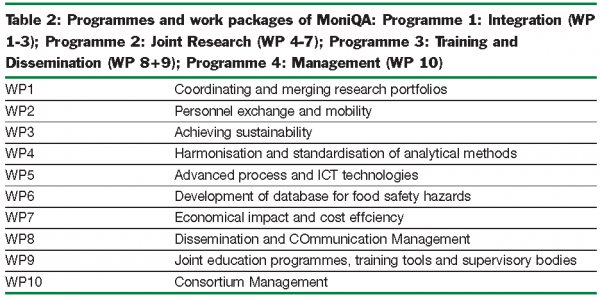



Work in progress and future activities
Setting thematic priorities
The possible topics concerning food safety and quality assessment are diverse and manifold. In the original MoniQA proposal we mentioned various themes that appeared to be hot topics at the time, such as HACCP, sampling, use and validation of rapid methods (e.g. DNA-based methods, ELISA-based methods, spectroscopy-based methods, advanced technologies), availability and use of (Certified) Reference Materials, shelf life and storage of food products, traceability of food products and components, food safety issues (biotoxins, food allergens, microbiological contaminants, banned and toxic ingredients, animal feed residues, plant production residues, industrial residues), food quality issues (authenticity of raw materials and food products, indicators for processing and storage history, shelf life quality indicators, packaging/contact materials, chemical indicators), social and legal aspects, and economical impact. After evaluating various reliable source of information the thematic priorities within MoniQA NoE have been defined by weighting RASFF data, European legislation (e.g. new and upcoming Regulations and Directives), available data on official and new/rapid methods for food hazards, active working groups in CEN, especially CEN TC 275 on horizontal methods and Codex Alimentarius (Joint Programme of WHO and FAO), recently published methods by organisations represented in IAM (Inter Agency Meeting), and of course by the input from the MoniQA partners, Stakeholders (interested parties outside the Core Consortium) and the MoniQA Advisory Panel. The thematic priorities for the MoniQA consortium have been proposed to cover 6 hot topics and 9 horizontal issues (see Figure 2).
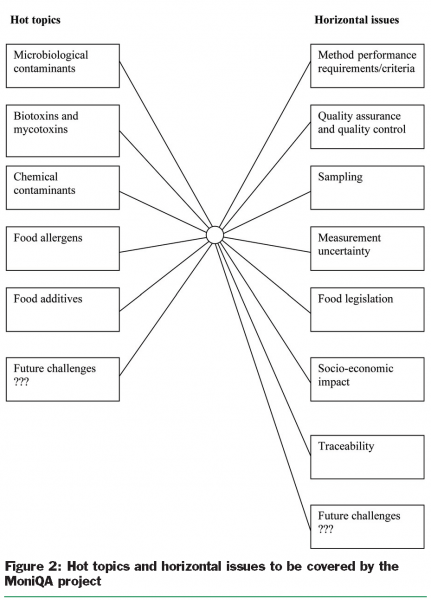

Establishing working groups
According to the thematic priorities, working groups are being established within MoniQA, which will work horizontally across the 10 Workpackages and will involve input from Stakeholders and members of the MoniQA Advisory Panel (see Figure 3).
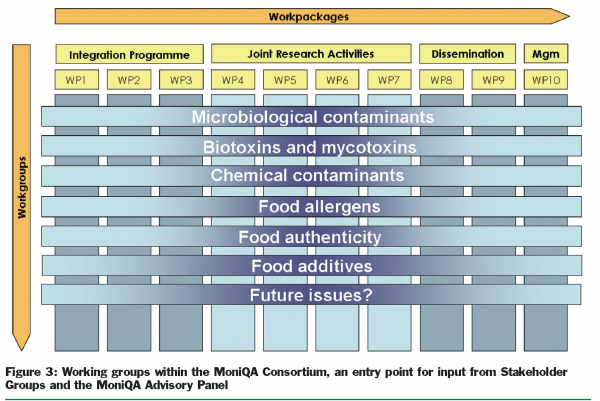

Building the network
The aim is to build a database on the available skills and competencies of all consortium partner institutions as well as the involved individuals. The availability of methods and specific relevant appliances, research interests and information on future strategies will help establish close co-operations and evaluate potential merging of activities or whole research groups/departments. Currently the consortium database is filled with relevant information gained from online questionnaires within the MoniQA consortium.
Initiating new research co-operations
The MoniQA project aims to establish a scientific network and provide the necessary infrastructure to boost international research co-operations in the area of food quality and safety assessment. Within the consortium various partners have started setting up research proposals to be funded by national and/or international sources. MoniQA partners from the EU network intend to establish new research proposals within FP7. Several MoniQA partners outside the EU, e.g. New Zealand and China have submitted proposals for national funding of complementary national research activities involving international partners from within the MoniQA network.
Constructing databases
The construction of two sets of databases have been initiated within MoniQA: 1) a Consortium Database to allow a fast search for competences, special appliances and experts within MoniQA, and 2) a Research Database to allow a fast search on relevant analytical methods for specific analytes, including information on the degree of validation, legal requirements, legal limits, and availability. The databases will be extended and updated on a regular basis. The Consortium Database is currently only open for internal use, but the Research Database will become publicly accessible on basis of a user fee.
Working for better regulations
MoniQA NoE deals with the systematic assessment of new regulations in the field of food quality and safety. MoniQA will set evaluation criteria (e.g. effectiveness, efficiency and consistency and it will compare the impact of different options in qualitative, quantitative and monetary terms). The project will also assess the administrative costs imposed by new regulations in the field of food quality and safety.
In this respect, members of the MoniQA consortium and representatives from the European Commission’s Secretariat General, DG Enterprise, DG SANCO, DG Environment and DG Finance met for a workshop in Brussels 23 March 2007 to co-ordinate collaborations between the MoniQA NoE and the various Directorates of the European Commission for better and more cost effective regulations in the future. In a follow-up meeting at the University of Bonn, Germany, on 5th June 2007, input from EU and USA experts in socio-economics and new regulations was sought.
Establishing a mobility programme and initiating student exchanges
Mobility of researchers and students will be promoted by setting up a mobility programme, which will initially only be available for MoniQA partners, but which should be extended to Associates and invited experts in the future. The mobility programme will include templates for bilateral contracts and schemes to receive research grants for short and long term research stays.
Meetings and other events
Meetings are an integral part of the MoniQA Network. After the kick-off Meeting in Vienna, the MoniQA consortium will meet again in Glasgow, UK, between 5-7 September 2007 for a working meeting, and the 1st Annual Meeting of MoniQA in Athens, Greece, will take place between 12-14 February 2007. In addition to various workpackage and work group meetings during the year, MoniQA also offers training to its partners, e.g. Workshops in Austria and China. For knowledge transfer and networking with non-partners of MoniQA, workshops and conferences as well as specific MoniQA sessions at international events have been initiated:
1. Technical session on food safety at the 13th International Conference for Grain & Oil Science and Technology, Guangzhou, China, 20-22 June 2007;
2. ICC Workshop on animal feed and its contribution to human health in Glasgow, UK, 2-5 September 2007;
3. MoniQA International Congress on Food Safety Assessment, Italy, 2008.
Extending the network – How to get involved in MoniQA
The MoniQA Network has established links to relevant other Research Projects within EU’s FP 6 and also globally to exchange information and initiate international collaborations. In a second step, the MoniQA Network will evaluate the pathways to invite various stakeholders (see Figure 4) as Associated Partners in MoniQA. It is planned to decide on the terms and conditions for this kind of participation in Glasgow at the next MoniQA consortium Meeting. Currently there is an informal call for applicants to apply for associated membership by completing a form provided by the project coordinator at [email protected].
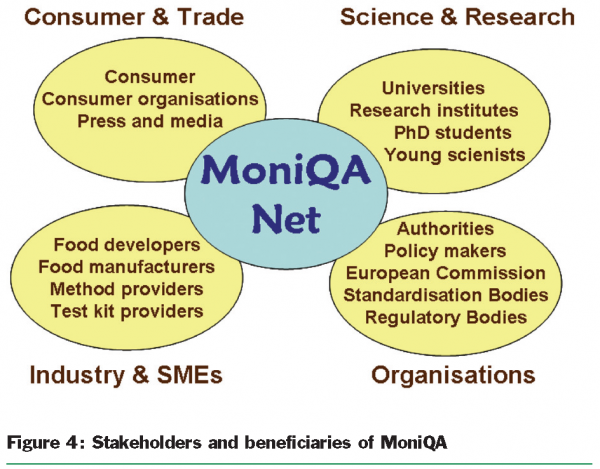

Currently MoniQA can offer the following benefits:
- Favourable conditions for participation in MoniQA events
- Favourable conditions for MoniQA results of commercial value
- Simplified promotion to full membership if desired
- No direct participation in the joint research programme
- Voluntary participation in the “Integration” and “Dissemination” programmes
- No participation in the Management Programme
- Signing of a Memorandum of Understanding including a non-disclosure agreement.
Associated partnership will require an annual subscription fee, which will be determined by the size and type of institution, where academia and SMEs will have favourable conditions.





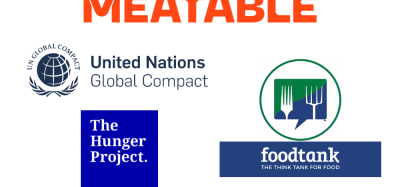




Working on food quality and safety is such a great job but it couldn’t be possible without the support of government and the other major entities involved in food manufacturing. Thanks for providing the above information.